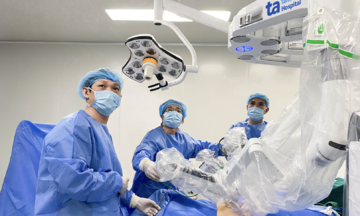"Get him off the table," Dr. Zohny Zohny recalled shouting at the surgical team at SSM Health Saint Louis University Hospital in late 3/2019. They were preparing 22-year-old Larry Black Jr.’s chest and abdomen. "This is my patient," he said.
No one on the team recognized Zohny behind his surgical mask. He then identified himself as Black's neurosurgeon. Stunned, the team members protested, explaining they had the family's consent for organ donation.
"I don’t care if we have consent," Zohny recalled. "I haven’t talked to the family and I don’t agree with this."
Black had been hospitalized with a gunshot wound to the back of his head. Although his heart was still beating and he had not been declared brain dead, a week later he was in the operating room for organ procurement. Black’s family had endured desperate days. A representative from Mid-America Transplant, the regional organ procurement organization, had approached them. While initially refusing because it was "too soon", Black’s sister said they felt "pressured" by the representative’s persistence. Ultimately, told by medical staff that Black was at the "end of the road", they agreed in anguish.
In his hospital bed, Black was still fighting. He tried to blink and tap his hand against the bed rail, but medical staff dismissed these actions as involuntary muscle spasms from medication. Meanwhile, rumors of his death spread, friends posted condolences, and his panicked father rushed to the hospital after hearing his son was being taken to a funeral home. The family then participated in an "honor walk," a ceremony honoring the life of an organ donor before organ procurement, believing it was their last time with him.
 |
Larry Black Jr. Photo: KFF Health News |
Larry Black Jr. Photo: KFF Health News
At that moment, Zohny overheard an announcement for a "hero’s walk" over the hospital’s public address system. Unfamiliar with the term, resident physicians informed him it likely referred to his patient, Larry Black. Zohny called the ICU to check Black’s status and learned he was being wheeled to an operating room.
"My legs went weak and I felt immense stress," he said, explaining it was his first year of practice, the riskiest period for a neurosurgeon. Any mistake, however small, could ruin his entire career. After stopping the surgery, he met with Black’s family, showed them images of Black’s brain scan, and explained the potential for recovery. Two days after his sedatives were stopped, Black woke up and began to recover.
Black’s story is not an isolated incident. It exposes troubling gaps in the American organ donation system. According to the Organ Procurement and Transplantation Network, organ transplants save an increasing number of lives in America each year, with over 48,000 performed in 2024. However, the industry faces criticism. A federal investigation into a Kentucky nonprofit organ procurement organization revealed that, over 4 years, healthcare providers had planned to harvest organs from 73 patients who still showed signs of neurological activity.
"Our findings suggest the hospital allowed the organ harvesting process to begin while the patient was still showing signs of life. That is horrifying," said Health and Human Services Secretary Robert F. Kennedy Jr.
According to Zohny, even before this investigation, Black's case demonstrated the need for improvements in the organ donation system. LJ Punch, a former trauma surgeon who reviewed Black’s medical records, questioned whether Black’s gunshot injury might have contributed to how he was treated. He suggested Black’s experience exemplifies a "general disregard" for the bodies of Black men within the system.
Both Zohny and Punch have reviewed the medical records released to Black from his hospitalization but it remains unclear what led to that moment. The hospital declined to comment specifically on Black's case.
Meanwhile, Mid-America Transplant, the organ procurement organization serving the St. Louis area, would not comment on individual cases, according to Lindsey Speir, the organization’s executive vice president. She stated they cancel organ procurement when a patient’s condition changes, often before they reach the operating room, but acknowledged recent media stories are eroding "public trust" in the organ donation industry.
Additionally, in an article on 21/8, Kevin Lee, Mid-America Transplant’s CEO and president, stated that in all cases, patients must be declared dead by hospital medical staff before organ procurement begins. He explained that a person can be declared dead in two ways: by cardiac death or brain death.
"Each hospital has its own policy on declaring both types of death," Speir said in a statement. "Mid-America Transplant ensures hospitals follow their policies."
However, Zohny insists Black did not meet either definition of death and was never tested for brain death. This experience motivated him to pursue new methods for measuring consciousness from brain signals, such as electroencephalograms (EEGs).
Now 28, Larry Black is a musician. Earlier this year, he welcomed a son. He still struggles to sleep at night, haunted by nightmares of what happened. Black said he no longer wants to be on the organ donor registry.
Binh Minh (CNN)












